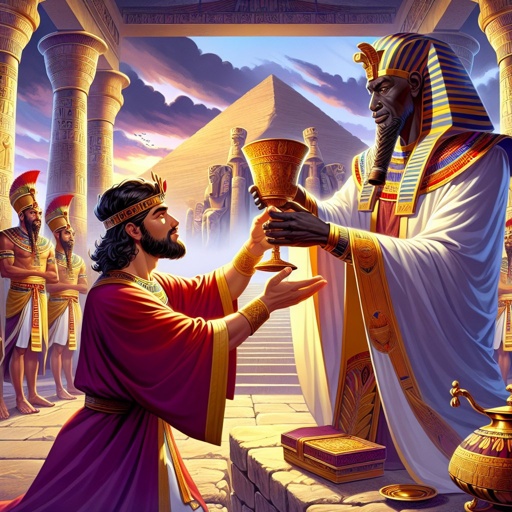THE SEED
“And he restored the Chief Butler unto his butlership again; and he gave the cup into Pharaoh’s hand” Genesis 40:21
Restoration can be described as the process of returning something to its original state or given by to the owner what was lost. Divine Restoration of human health or lost memory on the other hand, is an act of God because only the Creator of heaven and earth has the knowledge and ability to restore humanity to its original state. The sin of Adam and Eve in the Garden of Eden robbed mankind of their dominion in creation. This led to separation from God and attracted death and other terrible curses. Thereafter, life became full of different kinds of sins – idolatry, immorality, wickedness – until life became unbearably difficult. At this point, our loving and compassionate God decided to end the misery by restoring man’s dominion through redemption by the Lord Jesus Christ. Restoration is a complete package that includes forgiveness of sins, freedom from guilt and mercy rather than judgement. It usually comes as an act of mercy, favour, compassion and love, with the sole aim of reconciling mankind to God. Our God can restore ill health, failing businesses, damaged relationships, broken marriages and lost opportunities. All you need to do is cry unto Him for help, He has done it before, He restored life to Lazarus in John 11:43-44 and the son of the widow of Nain in Luke 7:11-15. He restored sight to a man born blind in John 9:1-7. His forgiveness leads to your peace, reconciliation, healing, progress, joy, prosperity, and answer to prayers.
BIBLE READING: Luke 6:6-10
PRAYER: Father, restore everything that I may have lost in time past, in Jesus Christ name.
IMU PADA BỌ̀SIPO
IRUGBIN NAA
“O sí tún mú olórí agbọ́ti pada sí ipò rẹ; on sí fí ago le Farao li ọwọ́.” Genesisi 40:21
A le ṣe apejuwe imupadabọsipo gẹgẹbi ilana ti ipadabọ nkan si ipo tí o wà rí ; tabi fifun ni pada, ni ohun ti o sọnu. Ìmúpadàbọ̀sípò àtoke wa nipa ti ìlera ẹ̀dá ènìyàn, tàbí tí ó pàdánù láti lè ni ìrántí ní ìhà kejì, jẹ́ ìṣe Ọlọ́run nítorí pé Ẹlẹ́dà ọ̀run àti ayé nìkan ni ó ní ìmọ̀ àti agbára láti mú ìran ènìyàn padàbọ̀ sípò sí ìpilẹ̀ṣẹ̀ rẹ̀. Ẹ̀ṣẹ̀ Ádámù àti Éfà nínú ọgbà Édẹ́nì ti gba ìṣàkóso ọmọ aráyé lọ́wọ́ wọn nínú ìṣẹ̀dá. Èyí yọrí sí ìyapa kúrò lọ́dọ̀ Ọlọ́run ó sì fa ikú àti àwọn ègún búburú mìíràn mọ́ra. Lẹ́yìn náà, ìgbésí ayé kún fún oríṣiríṣi ẹ̀ṣẹ̀ – ìbọ̀rìṣà, ìwà pálapàla, ìwà búburú títí tí ayé fi di ìṣòro tí kò ní ifara dà. Ní àkókò yìí, Ọlọ́run onífẹ̀ àti oníyọ̀ọ́nú pinnu láti fòpin sí ìdààmú nípa mimú ìṣàkóso ènìyàn padà bọ̀ sípò nípasẹ̀ ìràpadà Jésù Kristi Olúwa. Imupadabọsipo jẹ àgbè kalẹ pipe ti o pẹlu idariji ẹṣẹ, ati aanu ju idajọ lọ. Ó sábà máa ń wá gẹ́gẹ́ bí ìṣe àánú, ojú rere, ìyọ́nú àti ìfẹ́, pẹ̀lú ìpinu kan ṣoṣo lati mú ẹ̀dá ènìyàn bá Ọlọ́run làjà. Ọlọ́run wa lè mú ìlera padà bọ̀ sípò, àwọn òkowò tó kùnà, àjọṣe tó bà jẹ́, ìgbéyàwó tó dàrú àti àwọn àǹfààní tó sọnù. Gbogbo ohun ti o nilo lati ṣe, ni ki o kigbe titi yíó fi ṣe iranlọwọ fun u. Ó ti ṣe é tẹ́lẹ̀ rí, Ó jí Lásárù dìde nínú Isa oku. Jòhánù 11:43-44 àti ọmọ opó Náínì nínú Lúùkù 7:11-15. Ó tún fi iríran fún ọkùnrin kan tí a bí ní afọ́jú láti ínú iya rẹ. Jòhánù 9:1-7. Idariji Rẹ nyọrisi alaafia, ilaja, iwosan, ilọsiwaju, ayọ, iṣerere ati idahun si awọn adura.
BIBELI KIKA: Luku 6:6-10
ADURA: Baba, da ohun gbogbo ti mo ti sọnù nigba Kàn rí pada, ni orúkọ Jesu Kristi Amin.
